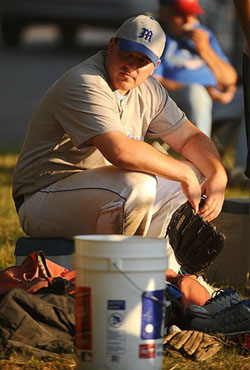Resilience, or “m ental toughness,” is a key psychological aspect of sport. The ability to bounce back from a poor performance or a detrimental mistake is crucial to an athlete’s success. As much as athletes hate to admit it, failure is a part of the game. A baseball player with a batting average of .3 has failed 7 times out of 10 at the plate. It is important to recognize that mistakes and failure are part of the game (Halden-Brown, 2003). However, when an athlete places too much emphasis on his or her failures, performance begins to suffer.
ental toughness,” is a key psychological aspect of sport. The ability to bounce back from a poor performance or a detrimental mistake is crucial to an athlete’s success. As much as athletes hate to admit it, failure is a part of the game. A baseball player with a batting average of .3 has failed 7 times out of 10 at the plate. It is important to recognize that mistakes and failure are part of the game (Halden-Brown, 2003). However, when an athlete places too much emphasis on his or her failures, performance begins to suffer.
Athletes need to remain in the present moment and focus on the task at hand. It is difficult to focus on the present when the mind is occupied with an error that occurred three plays ago.
Performance errors may cause an athlete to lose control of their emotions as well as diminish their confidence. The whirlwind of negative emotions coupled with reduced confidence only leads to more errors and further deterioration of performance.
Developing “mental toughness” or resilience will help an athlete perform well in the face of adversity. A resilient athlete is one who is able to overcome setbacks, remain confident, and focus on the present (Solomon and Becker, 2004).
So the real question is: how can an athlete become resilient?
The most apparent method is not an easy one. An athlete must face and conquer adversity in order to successful cope with it in the future. The saying “what doesn’t kill you makes you stronger” applies perfectly to an athlete coming off a bad performance. Past mastery experiences boost self confidence, which leads to great performance (Bandura, 1997). An effective tool an athlete can use in a practice or game setting is a trigger. A trigger word or action can help an athlete refocus and clear his or her mind quickly.
For example, a batter who swings at a pitch in the dirt can step out of the box and readjust his batting gloves. While adjusting the gloves, he is letting go of the previous pitch and clearing it from his mind. When he steps into the box again, he is thinking only of the oncoming pitch.
The adjustment of the gloves is a physical trigger which represents releasing a past mistake as well as an action to refocus the mind. A conscious effort must be made by the athlete to push all negative thoughts and feelings associated with the mistake out of his mind while adjusting those gloves. While difficult at first, over time the trigger action will elicit an immediate psychological response.
The ability to let go of mistakes is vital to a successful performance. The better an athlete can do this, the better equipped he will be to cope with trying situations in sport. Elite athletes possess a mental toughness that allows them to thrive off of failure and relish success.
References
Bandura, A. (1997). Self-efficacy: The exercise of control. New York, NY: Freeman.
Solomon, G., & Becker, A. (2004). Focused for fastpitch: 80 drills to play and stay sharp. Champaign, IL: Human Kinetics.
Schinke, R. J., Peterson, C., & Couture, R. (2004). A protocol for teaching resilience to high performance athletes. Journal of Excellence, 9, 9-18.
Article by Lindsey Oro, Springfield College

























